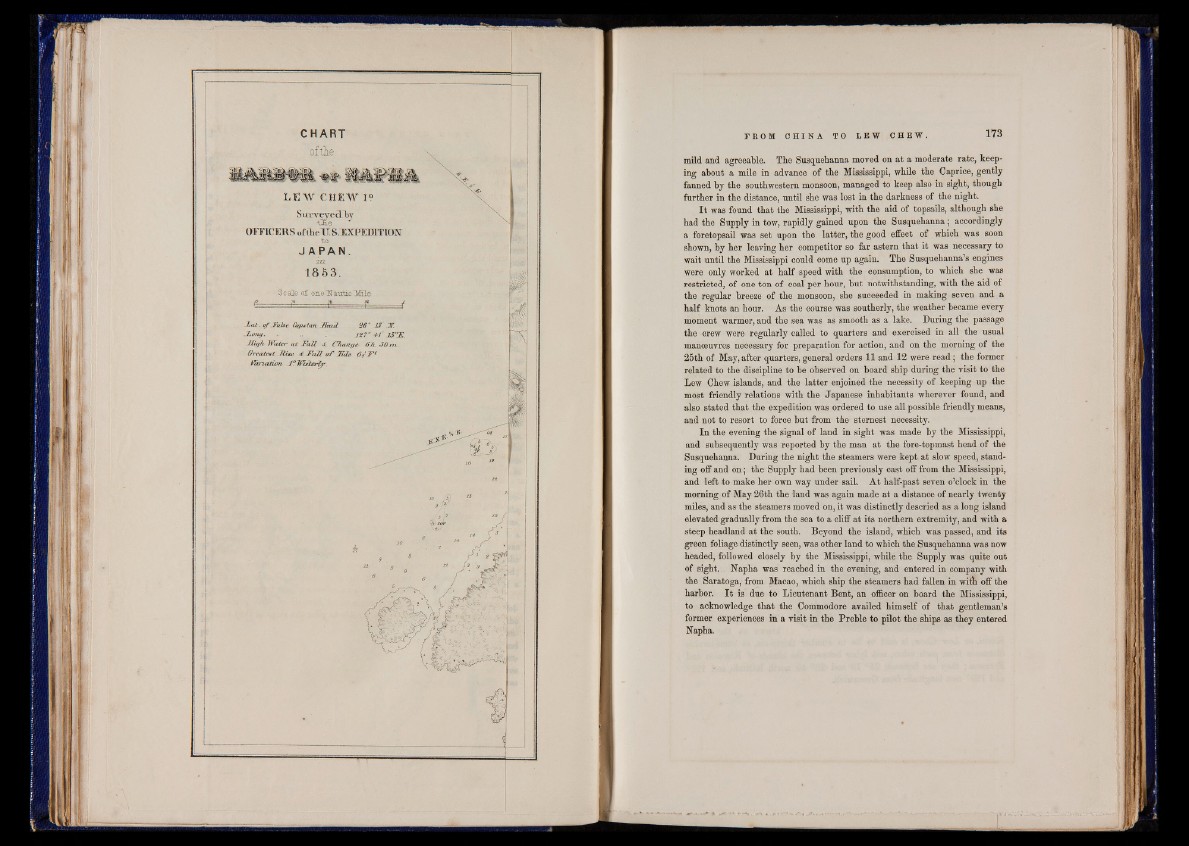
CHART
oftie
LEW CHEW f l
SwrveyedTby
■th.e
OITICEKS of the I I S.LXPrDITTON
■feo
JAPAN.
1 8 5 3 .
Scale of one Uautic 1/BIe
L a t . o f F a ls e Capstan H e a d 2 6 ° J J J f .
JjOtuj. .. 127° 4-1' 15°JE.
JUgTv Water at Fall JL Change- 6h. 30 m.
Greatest Jiise £ FctU o f Tule 6yFf
Variation J?Weiterfy-.
1
i K
mild and agreeable. The Susquehanna moved on at a moderate rate, keeping
about a mile in advance of the Mississippi, while the Caprice, gently
fanned by the southwestern monsoon, managed to keep also in sight, though
further in the distance, until she was lost in the darkness of the night.
I t was found that the Mississippi, with the aid of topsails, although she
had the Supply in tow, rapidly gained upon the Susquehanna; accordingly
a foretopsail was set upon the latter, the good effect of which was soon
shown, by her leaving her competitor so far astern that it was necessary to
wait until the Mississippi could come up again. The Susquehanna’s engines
were only worked at half speed with the consumption, to which she was
restricted, of one ton of coal per hour, but notwithstanding, with the aid of
the regular breeze of the monsoon, she succeeded in making seven and a
half knots an hour. As the course was southerly, the weather became every
moment warmer, and the sea was as smooth as a lake. During the passage
the crew were regularly called to quarters and exercised in all the usual
manoeuvres necessary for preparation for action, and on the morning of the
25th of May, after quarters, general orders 11 and 12 were read; the former
related to the discipline to be observed on board ship during the visit to the
Lew Chew islands, and the latter enjoined the necessity of keeping up the
most friendly relations with the Japanese inhabitants wherever found, and
also stated that the expedition was ordered to use all possible friendly means,
and not to resort to force but from the sternest necessity.
In the evening the signal of land in sight was made by the Mississippi,
and subsequently was reported by the man at the fore-topmast head of the
Susquehanna. During the night the steamers were kept at slow speed, standing
off and on; the Supply had been previously cast off from the Mississippi,
and left to make her own way under sail. At half-past seven o’clock in the
morning of May 26th the land was again made at a distance of nearly twenty
miles, and as the steamers moved on, it was distinctly descried as a long island
elevated gradually from the sea to a cliff at its northern extremity, and with a
steep headland at the south. Beyond the island, which was passed, and its
green foliage distinctly seen, was other land to which the Susquehanna was now
headed, followed closely by the Mississippi, while the Supply was quite out
of sight. Napha was reached in the evening, and entered in company with
the Saratoga, from Macao, which ship the steamers had fallen in with oft the
harbor. I t is due to Lieutenant Bent, an officer on board the Mississippi,
to acknowledge that the Commodore availed himself of that gentleman’s
former experiences in a visit in the Preble to pilot the ships as they entered
Napha.